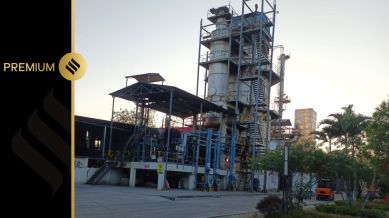An award-winning journalist with 14 years of experience, Nikhil Ghanekar is an Assistant Editor with the National Bureau [Government] of The Indian Express in New Delhi. He primarily covers environmental policy matters which involve tracking key decisions and inner workings of the Ministry of Environment, Forest and Climate Change. He also covers the functioning of the National Green Tribunal and writes on the impact of environmental policies on wildlife conservation, forestry issues and climate change. Nikhil joined The Indian Express in 2024. Originally from Mumbai, he has worked in publications such as Tehelka, Hindustan Times, DNA Newspaper, News18 and Indiaspend. In the past 14 years, he has written on a range of subjects such as sports, current affairs, civic issues, city centric environment news, central government policies and politics. ... Read More
Union Carbide waste locked up in containers and waiting to be burnt, a village says, ‘Not in our backyard’
Residents fear contamination amid distrust over green norms; Bhopal plant clean-up also awaited

Tarpura in Madhya Pradesh’s Pithampur is Ground Zero where 12 long-haul containers packed with hazardous waste are parked in a private treatment, storage and disposal facility — waiting to be incinerated. There are policemen stationed across the village. And in one corner, residents in houses that face the site where the containers are parked say that to maintain law and order, they have been barred from going atop their terraces.
Even as 337 MT of hazardous waste from the Union Carbide India Limited (UCIL) plant in Bhopal has been moved to Pithampur, the Madhya Pradesh government faces another immediate challenge: convincing local residents that the incineration will be carried out following environmental norms.
monthly limit of free stories.
with an Express account.
On January 3, a day after the 12 containers arrived at Pithampur, local residents, shop owners, businessmen, teachers, school students and political workers gathered for a “general strike” against the incineration. With tensions rising, the Dhar district administration has withheld opening of the containers — and launched an information, education and communication outreach.
“We will reach out to everyone, from farmers to workers, teachers, Anganwadi workers and businessmen. We will distribute science-based content in the communities to spread awareness of the steps that would be taken to handle this waste,” Dhar collector Priyank Mishra, who began the outreach with industry bodies and associations on January 7, told The Indian Express.
Known as the “Detroit of Madhya Pradesh”, Pithampur’s industrial area is home to automobile manufacturers, and pharmaceutical, detergent and chemical companies. And the town, which lives and breathes amid the pollution of its local industrial area, has demanded that the Union Carbide waste should not be disposed of at the facility owned by Re Sustainability, the private disposal firm formerly known as Ramky Enviro Engineers.
Dr Hemant Hirole, a social activist based in Tarpura, said the town’s history of industrial pollution, the odour from the disposal plant and the late outreach have created uncertainty. “We are not convinced that environmental norms will be followed because we witness and live in a polluted environment. We believe that the hazardous waste processing facility and its landfills, which is situated on an elevated area, is affecting our water sources along with other industries. We will keep pursuing legal channels and social agitations on the issue,” Hirole said.
Vishnu Chaudhary, a 55-year-old farmer from Chirakhan, said industrial activity over the years has increased salinity in the groundwater, affecting drinking water, farm produce and borewell tubes. “Most homes in our villages use RO filters. Many of my fellow villagers have skin troubles. Environmental degradation is a daily reality here and we have opposed this hazardous waste processing facility from day one. We do not want the Bhopal waste to burn here,” he said.
Re Sustainability did not respond to detailed queries mailed by The Indian Express regarding the disposal and the local concerns. Officials of the Bhopal Gas Tragedy Relief and Rehabilitation department, which is supervising the disposal process, did not respond to calls and messages from The Indian Express seeking comment.
In 2010, the last detailed assessment of the area in and around the Bhopal plant, carried out by the National Environmental Engineering Research Institute (NEERI) and National Geophysical Research Institute (NGRI), had revealed that an estimated 1.1 million tonnes of soil was contaminated and required remediation.
Last June, the Centre’s oversight committee on the Bhopal plant contamination, headed by the Union Environment Minister, discussed plant remediation and clean-up. During this meeting, the Centre directed the MP government to undertake fresh studies of the Union Carbide premises with assistance of NEERI and NGRI. It also asked the state government to prepare a plan for detoxification, decommissioning and dismantling of the estimated 1,500 MT of corroded plant and remediation of areas affected by mercury spillage and underground dumps.
Rachna Dhingra of the Bhopal Group for Information and Action, said that Dow, which bought over Union Carbide, should own up to the liability for damage caused. “When it comes to Dow’s liability, they have taken Union Carbide’s liabilities in the US. In the matter before the MP High Court, Dow has been contesting the jurisdiction of Indian courts. They cannot have double standards,” Dhingra said.